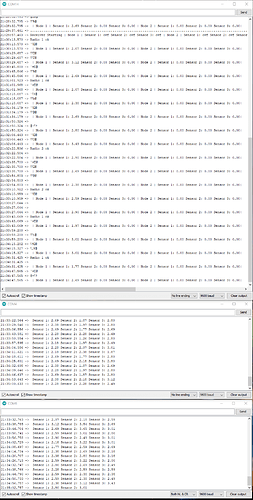I'm trying to make a sensor network using 2 transmitter units and 1 receiver.
The transmitter units are consisting of:
1xArduino UNO
1xNRF24l01
3xCapacitive Soil moisture sensors
The receiver consists of:
1x ESP32 WROOM 32UE
1x NRF24l01
Transmitter code
// Simple Arduino code to predict volumetric
// water content in soil using a capacitive
// soil moisture sensor
//
#define soil_pin1 A0 // AOUT pin on sensor
#define soil_pin2 A1
#define soil_pin3 A2
#include <SPI.h>
#include <nRF24L01.h>
#include <RF24.h>
RF24 radio(7, 8); // CE, CSN
const byte address[6] = "00001";
float slope = 129.24; // slope from linear fit
float intercept = -62.03; // intercept from linear fit
float voltage1; // preallocate to approx. voltage and theta_v
float voltage2; // preallocate to approx. voltage and theta_v
float voltage3; // preallocate to approx. voltage and theta_v
float node1Sensor1 = 0;
float node1Sensor2 = 0;
float node1Sensor3 = 0;
void setup() {
Serial.begin(9600); // serial port setup
analogReference(EXTERNAL); // set the analog reference to 3.3V
radio.begin();
radio.openWritingPipe(address);
radio.setPALevel(RF24_PA_MAX);
radio.stopListening();
}
void loop() {
const char text[] = "Radio 1 ok";
radio.write(&text, sizeof(text));
delay(1000);
calculations();
radiosend();
printRAWvalues();
}
void calculations(){
for (int i = 0; i <= 1000; i++)
{
node1Sensor1 = node1Sensor1 + analogRead(soil_pin1);
delay(1);
}
node1Sensor1 = node1Sensor1/1000.0;
for (int i = 0; i <= 1000; i++)
{
node1Sensor2 = node1Sensor2 + analogRead(soil_pin2);
delay(1);
}
node1Sensor2 = node1Sensor2/1000.0;
for (int i = 0; i <= 1000; i++)
{
node1Sensor3 = node1Sensor3 + analogRead(soil_pin3);
delay(1);
}
node1Sensor3 = node1Sensor3/1000.0;
voltage1 = (float(analogRead(soil_pin1))/1023.0)*3.3;
node1Sensor1 = ((1.0/voltage1)*slope)+intercept; // calc of theta_v (vol. water content)
voltage2 = (float(analogRead(soil_pin2))/1023.0)*3.3;
node1Sensor2 = ((1.0/voltage2)*slope)+intercept; // calc of theta_v (vol. water content)
voltage3 = (float(analogRead(soil_pin3))/1023.0)*3.3;
node1Sensor3 = ((1.0/voltage3)*slope)+intercept; // calc of theta_v (vol. water content)
}
void radiosend(){
radio.write(&node1Sensor1, sizeof(node1Sensor1));
radio.write(&node1Sensor2, sizeof(node1Sensor2));
radio.write(&node1Sensor3, sizeof(node1Sensor3));
}
void printToSerial() {
Serial.println("Sensor 1");
Serial.print("Voltage: ");
Serial.print(voltage1); // read sensor
Serial.print(" V, Theta_v: ");
Serial.print(node1Sensor1);
Serial.println(" cm^3/cm^3"); // cm^3/cm^3
delay(1000); // slight delay between readings
Serial.println("________________________________");
Serial.println("Sensor 2");
Serial.print("Voltage: ");
Serial.print(voltage2); // read sensor
Serial.print(" V, Theta_v: ");
Serial.print(node1Sensor2);
Serial.println(" cm^3/cm^3"); // cm^3/cm^3
delay(1000); // slight delay between readings
Serial.println("________________________________");
Serial.println("Sensor 3");
Serial.print("Voltage: ");
Serial.print(voltage3); // read sensor
Serial.print(" V, Theta_v: ");
Serial.print(node1Sensor3);
Serial.println(" cm^3/cm^3"); // cm^3/cm^3
delay(1000); // slight delay between readings
Serial.println("________________________________");
}
void printRAWvalues(){
Serial.print(" Sensor 1: ");
Serial.print(node1Sensor1);
delay(500);
Serial.print(" Sensor 2: ");
Serial.print(node1Sensor2);
delay(500);
Serial.print(" Sensor 3: ");
Serial.print(node1Sensor3);
delay(500);
Serial.println(" ");
}
Receiver Code
#include <SPI.h>
#include <nRF24L01.h>
#include <RF24.h>
#include <WiFi.h>
#include <WiFiAP.h>
#include <WiFiClient.h>
#include <WiFiGeneric.h>
#include <WiFiMulti.h>
#include <WiFiScan.h>
#include <WiFiServer.h>
#include <WiFiSTA.h>
#include <WiFiType.h>
#include <WiFiUdp.h>
#include <ThingSpeak.h>
#define CHANNEL_ID 1825464
#define CHANNEL_API_KEY "5FNV78UZAP4MDQ2Z"
#define CE_PIN 4
#define CSN_PIN 5
WiFiClient client;
#define WIFI_TIMEOUT_MS 20000
#define WIFI_NETWORK "SM-G950W1006"
#define WIFI_PASSWORD "cjck8186"
int counter = 0;
const byte address[6] = "00001";
RF24 radio(CE_PIN, CSN_PIN);
float node1Sensor1;
float node1Sensor2;
float node1Sensor3;
float node2Sensor1;
float node2Sensor2;
float node2Sensor3;
void setup() {
Serial.begin(9600);
connectToWiFi();
ThingSpeak.begin(client);
radio.begin();
radio.openReadingPipe(1, address);
radio.setPALevel(RF24_PA_MAX);
radio.startListening();
Serial.print("Receiver Starting");
}
void loop() {
counter++;
radioRead();
serialPrint();
thingSpeakSend();
if (radio.available()) {
char text[32] = "";
radio.read(&text, sizeof(text));
Serial.println(text);
char text2[32] = "";
radio.read(&text2, sizeof(text2));
Serial.println(text2);
}
}
void radioRead(){
radio.read(&node1Sensor1, sizeof(node1Sensor1));
radio.read(&node1Sensor2, sizeof(node1Sensor2));
radio.read(&node1Sensor3, sizeof(node1Sensor3));
radio.read(&node2Sensor1, sizeof(node2Sensor1));
radio.read(&node2Sensor2, sizeof(node2Sensor2));
radio.read(&node2Sensor3, sizeof(node2Sensor3));
}
void serialPrint(){
Serial.print(" | Node 1 |");
Serial.print(" Sensor 1: ");
Serial.print(node1Sensor1);
Serial.print(" Sensor 2: ");
Serial.print(node1Sensor2);
Serial.print(" Sensor 3: ");
Serial.print(node1Sensor3);
Serial.print(" | Node 2 |");
Serial.print(" Sensor 1: ");
Serial.print(node2Sensor1);
Serial.print(" Sensor 2: ");
Serial.print(node2Sensor2);
Serial.print(" Sensor 3: ");
Serial.print(node2Sensor3);
Serial.print("|");
Serial.println(" ");
delay(1000);
}
void thingSpeakSend(){
ThingSpeak.setField(1, node1Sensor1);
ThingSpeak.setField(2, node1Sensor2);
ThingSpeak.setField(3, node1Sensor3);
ThingSpeak.setField(4, WiFi.RSSI());
ThingSpeak.setField(5, counter);
ThingSpeak.writeFields(CHANNEL_ID, CHANNEL_API_KEY);
delay(15000);
}
void connectToWiFi(){
Serial.print ("Connecting to WiFi");
WiFi.mode(WIFI_STA);
WiFi.begin(WIFI_NETWORK, WIFI_PASSWORD);
unsigned long startAttemptTime = millis ();
while(WiFi.status()!= WL_CONNECTED && millis() - startAttemptTime < WIFI_TIMEOUT_MS){
Serial.print(".");
delay(100);
}
if (WiFi.status() != WL_CONNECTED){
Serial.println("Failed!");
}else{
Serial.print("Connected!");
Serial.print(WiFi.localIP());
}
}
As you can see from the code, the plan is to get the readings, transmit them using the NRF24l01 modules and then upload them to Thingspeak, now there are some issues.
-
Not all data is being received (See serial monitor output image, COM14 is Receiver, COM 6 is Node 1, COM4 is node 2)
-
When data is being received, some of it is garbled.
Afaik my connections are good since there is some data being sent, i'm worried that it is a problem with my code.
What would be a more efficient way to write my code?
My coding and electrical knowledge mostly ends with this project so pls be nice, and I would appreciate any resources to improve/learn more.
Thanks in advance
Please advise
